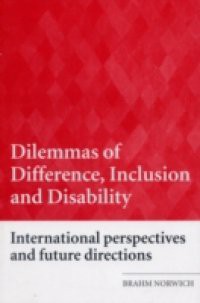**Shortlisted for the nasen Special Educational Needs Academic Book award 2008** Inclusion has become very influential internationally in the field of schooling. This has involved the introduction of policies that pursue more provision for, and acceptance of, students with special educational needs or disabilities in ordinary school settings. However, these policies represent different and often conflicting values and approaches to education. The basic dilemma of difference is whether to recognise or not to recognise differences, as either way there are negative implications or risks associated with stigma, devaluation, rejection or denial of relevant opportunities. This is the first book to examine ideas about these dilemmas from a range of disciplines and fields about the nature and origins of such dilemmas as they apply to special and inclusive education. In particular these dilemmas are about: identification - whether to identify students as having special educational needs / disabilities or not? curriculum - how much of a common curriculum is relevant to these students? placement - can appropriate learning can take place in ordinary schools and classes or not? This ground-breaking book examines professional educators and administrators at national and local authority level across three countries - England, USA and the Netherlands - and questions how they recognise tensions or dilemmas in responding to student differences. Of interest to researchers, students, academics and professionals, this study will provide a much needed, balanced and powerful contribution to the inclusion debate.

